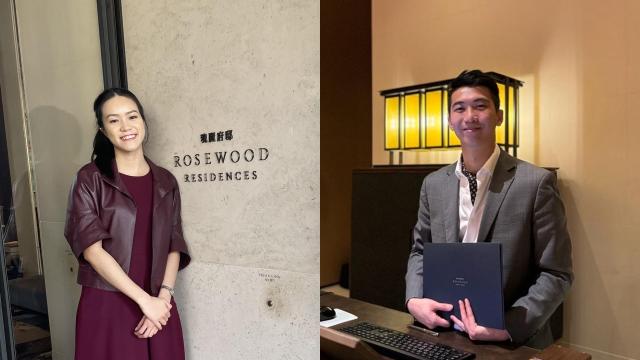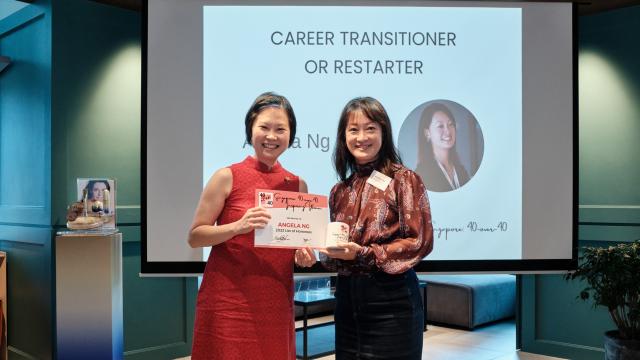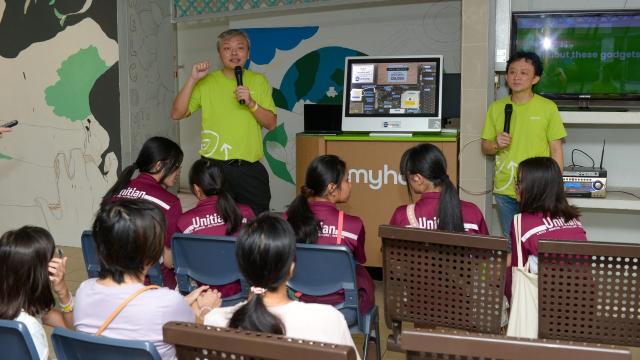Deborah Lim was a seasoned practitioner in the hotel industry before she joined SIT as a Professional Officer in 2018. These days, she helps SITizens in the Hospitality Business programme prepare for a successful start in their careers.
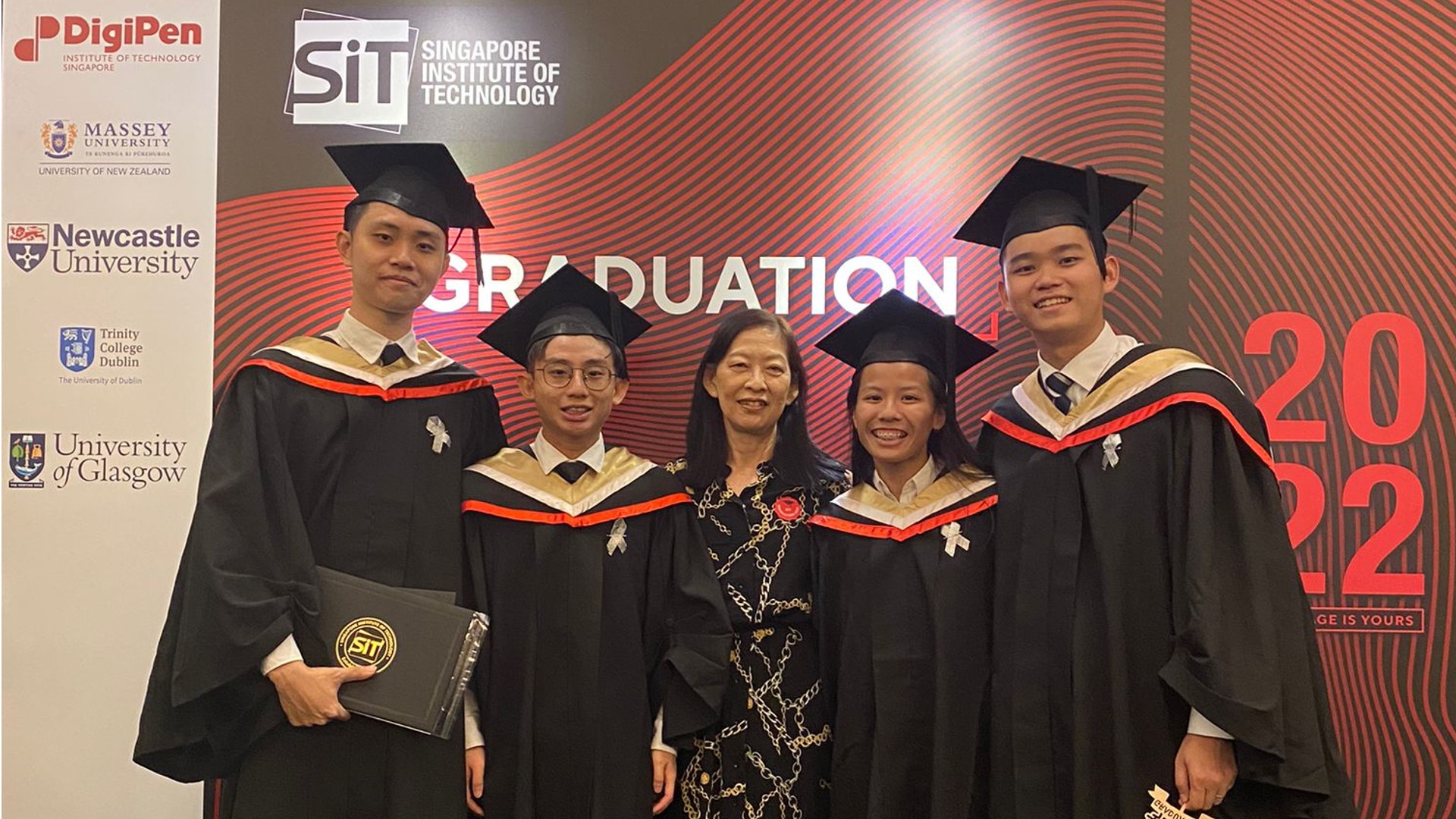
Deborah Lim (3rd from left) with her students and recent Hospitality Business graduates (Left to Right) Tow Jia Hon, Tan Jun Yong, Cheryl Tan, and Aderic Wong. (Photo: Deborah Lim)
When Deborah Lim chanced upon a recruitment advertisement for a Professional Officer (PO) role at SIT, she was intrigued by the job description. Although she was comfortable in her role as the Director of Central & Property Systems at Banyan Tree Hotels & Resort, she wanted an opportunity to share her knowledge and skills with young blood.
A Seasoned Professional
Deborah made her foray into the hospitality industry in the reservations department at the Mandarin Oriental. After learning the ropes, she rose from an entry-level position and took on the role of department head at the Regent.
Her broad experience later allowed her to join Micros-Fidelio, a hospitality software company where she was involved in implementing hospitality operations and systems. There, she grew her expertise in hospitality technology, which encompasses property management systems and all other distribution and management systems.
As an Opera PMS consultant, she designed and configured IT systems to suit the hotels’ operational needs. In addition to training hotel staff on how to use the system, she worked closely with the senior management to ensure that the systems met the hotel chain’s standards, financial requirements, and legal requirements.
Making the Switch
Deborah said, “Dealing with hospitality systems was second nature to me. It was easy working with hotel staff and conducting training for adults. At SIT, my role as a PO is very different because I have to wear many hats! Over time, I have learnt to be a coach, mentor, teacher, and friend to my students.”
Unlike the working adults she used to train, Deborah guides SITizens on their learning journey for a longer period of time. Aside from academic and practical knowledge, she also shares life lessons with them.
Deborah said, “POs at SIT play an important role in helping students relate what they learn in their classrooms to real life, so they can navigate the challenges in their future work environment. I help students ease into their Integrated Work Study Programme (IWSP) by sharing about real-life case studies I encountered at my previous workplace. It is an important part of their learning, although I suspect that they enjoy my ‘horror’ stories a little too much!”
Myths and Misconceptions about the Hospitality Industry
She observed that there are two common misconceptions that students have about the industry. First, they underestimate the level of ‘manual labour’ they have to do.
“If they are attached to the housekeeping department, students must learn how to clean a room. And they are often surprised how physically hard the work is!”
Students also have the impression that hospitality professionals are impeccable in every way. However, Deborah always tells students to prepare themselves for the challenging work environment.
“They need to understand that ‘managing’ colleagues and supervisors is just as important, and perhaps even more difficult than managing an irate guest!”
Now a Senior Professional Officer, Deborah said that the best part of her job is being able to interact with students.
She said, “I share their joy when they graduate and go out confidently into the working world to achieve the goals and objectives they set for themselves.”
Staying on Top of the Trends
To keep up with the latest hospitality trends, Deborah reads publications by international hospitality organisations such as Hospitality Sales and Marketing Association International and attends hospitality-related events such as Food & Hotel Asia.
She said, “Recently, I secured a one-week attachment with the Ramada Hotel to observe how the Reservations and Revenue Management Departments operate, and to learn about industry changes. My ex-colleagues also share the latest trends impacting the industry with me.”
Technology has definitely become the buzzword these days as more businesses ramp up on digitalisation. Due to the labour crunch, various departments also have to reorganise their manpower and become more adept at multi-tasking.
Deborah said, “There is a greater focus on self-service kiosks such as self-check-ins and self-checkouts these days. Meanwhile, sustainability and data analytics are also impacting the industry in a big way.”
Meanwhile, at the operations level, hotels are tightening up processes in the areas of hygiene and cleanliness. The housekeeping departments are reviewing their standard operating procedures.
Post-pandemic Realities: A Word to the Wise
In these challenging times, our SITizens must demonstrate greater adaptability and teamwork when they enter the workforce. The pandemic has shown how valuable it is to have employees with these qualities.
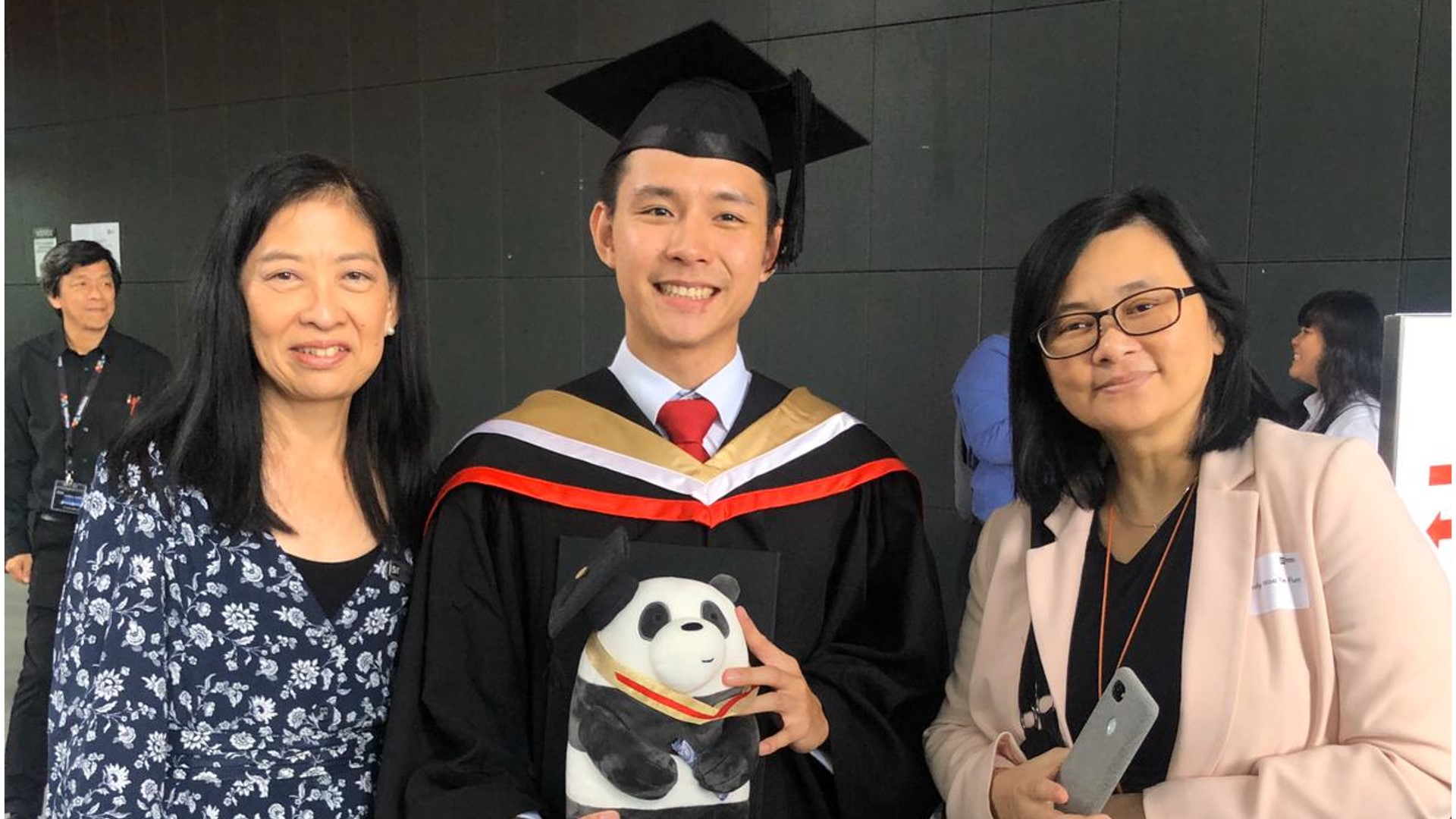
Deborah (left) with one of her students from the Class of 2021 (Photo: Deborah Lim)
Deborah said, “Employers are looking for talents who demonstrate a willingness to step up to help even though it is not their job.”
Students aiming to pursue a career in the hospitality industry must learn to be nimble because the hospitality industry is very dynamic. The pandemic has proven that hotels need to tweak their operations constantly to effectively manage different situations and requirements.
Attracting Top Talent
Most hotels and event companies prefer to hire graduates who already have some working knowledge of the industry, which is why the IWSP is invaluable to our fresh graduates.
Deborah said, “We often receive feedback that SIT graduates are highly sought after by the industry because of their work experience and ‘can do’ attitude.”
On the flip side, businesses who want to attract the best hires in a tight labour market may need to review compensation packages and offer a definitive career path in a tight labour market.
Deborah shared, “New entrants tend to be concerned with the low starting pay and slow career progression in hospitality compared with other industries. To attract top talent, companies must recognise that the new generation has different concerns, such as work-life balance and good working environments.”

